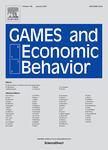-
作者:Yi, KO
作者单位:Sogang University
摘要:This paper investigates the implications of quantal response equilibrium (QRE) models [McKelvey and Palfrey, 1995, Games Econ. Behav. 10, 6-38; 1998, Exper. Econ. 1, 9-41] in the ultimatum bargaining game. It is shown that, in a normal-form QRE (NQRE), each bargainer's decision depends critically on the anticipated behavior of the other, and there is a NQRE in which the proposer makes any offer between zero and equal split as a strict best response. The application of NQRE to the experimental ...
-
作者:Bechara, A; Damasio, AR
作者单位:University of Iowa
摘要:Modem economic theory ignores the influence of emotions on decision-making. Emerging neuroscience evidence suggests that sound and rational decision making, in fact, depends on prior accurate emotional processing. The somatic marker hypothesis provides a systems-level neuroanatomical and cognitive framework for decision-making and its influence by emotion. The key idea of this hypothesis is that decision-making is a process that is influenced by marker signals that arise in bioregulatory proce...
-
作者:Glimcher, PW; Dorris, MC; Bayer, HM
作者单位:New York University
摘要:Over the past half century economists have responded to the challenges of Allais [Econometrica (1953) 53], Ellsberg [Quart. J. Econ. (1961) 643] and others raised to neoclassicism either by bounding the reach of economic theory or by turning to descriptive approaches. While both of these strategies have been enormously fruitful, neither has provided a clear programmatic approach that aspires to a complete understanding of human decision making as did neoclassicism. There is, however, growing e...
-
作者:Jackson, MO; van den Nouweland, A
作者单位:California Institute of Technology; University of Oregon
摘要:We analyze the formation of networks among individuals. In particular, we examine the existence of networks that are stable against changes in links by any coalition of individuals. We show that to investigate the existence of such strongly stable networks one can restrict focus on a component-wise egalitarian allocation of value. We show that when such strongly stable networks exist they coincide with the set of efficient networks (those maximizing the total productive value). We show that th...
